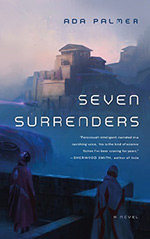
![]() everythinginstatic
everythinginstatic
4/12/2018
![]()
I am a Humanist because I believe in heroes, that history is driven by those individuals with fire enough to change the world.
This quote, in only the second chapter of the book, really sets the tone to this fantastic sequel to the utterly mind-boggling Too Like the Lightning . When I reviewed the first book last year, I said that I would feel the need to re-read it before delving into the sequel. Now, re-reading that review that I wrote, I feel that perhaps I should have spent more time delving into Too Like the Lightning, as some of the details are a bit fuzzy (what was this gut-wrenching Martin Guildbreaker chapters exactly?!). However, I should very firmly note that, for all my own memory failings, there is no let-up in the action and that I certainly didn't need to wait until the 40% mark for this to get going.
This second part of Mycroft Canner's history of Bridger, Jehovah and the seven Hives, picks up where the first book left off. However, now we are faced with conflict and consequences, now there are conspiracies unmasked, leadership structures toppled and the whole world stands on the brink of devastating conflict. So what does this war look like, in a future without borders, where we all have the choice of our family (our bash'), where we no longer need to work for money, where our needs are met? What would a world like this, without gender or religion, do to a person's identity? Overall, what is left to fight for, when these identity markers have been stripped?
The more people insist that feminism has won, the more they blind themselves to its remaining foes.
What Palmer does exceptionally well in this novel is to set up the two sides of the conflict (and they both feature the extensive cast of characters from the first novel) without really presenting the "right" one to root for. Remember, Mycroft is very much the unreliable narrator there, though we do have a couple of chapters from (supposedly) different perspectives. Again, while I don't think Mycroft actively interferes with the narrative there, I do think that we are intended to view everything that happens in the novel through this lens of skepticism and disbelief.
And you know what, I loved it. If you're able to embrace Mycroft's singularly unreliable narration, if you strip away his own emotions (about Saladin, Madame and Jehovah, but also the Saneer-Weeksbooth bash'), you are left with an incredible story about a society that appears, at first sight, to be completely utopian and one that, underneath the glitz and glamour, this Earth is just as fractured as ours, just as susceptible to manipulation and disaster. Were the Mardis right, though? Was Apollo himself right? And what do all the actions, sacrifices and decisions of this novel really say about human nature? So far into the future, in a world without borders, where scarcity is long forgotten, what could we possibly argue about, what could possibly set humanity on the path to war? Yet, as Palmer explores in Seven Surrenders, there is so much that we still hold on to, enough to destroy this idea of utopia.
Freud said all technology is a prosthetic god, a set of tool we weak humans strap on to give ourselves the powers we crave [...]
I have said it before, Too Like the Lightning and Seven Surrenders are really two halves of the same story (which, to my understanding, finishes in The Will to Battle, but how the fourth book fits in, I can't quite say) and for that reason, there isn't really a moment in this book where you don't feel that something momentous is about to happen. Reveals, betrayals, yes they're all there, but more than this, so much more, is the approach to philosophy. This is sci-fi at its best, when it questions human nature and the human condition. Is Madame right in her approach? Is it, instead, the battle to maintain this utopia, free from borders and religion and gender, one worth fighting and winning? I am not entirely sure, myself, and about 70% of the way through the novel, as everything comes to a head, I found myself swaying, undecided and unsure. But this is nevertheless a heady book and one I thoroughly recommend.
I can't wait to see what happens next.